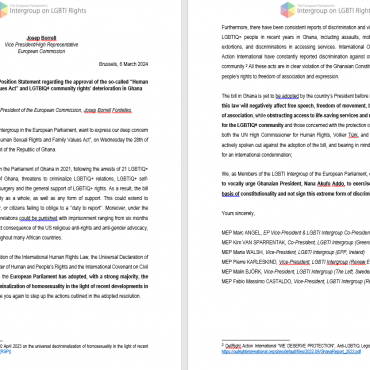Intergroup Bureau addresses Commission on the need to include LBTI women in the upcoming LGBTI Equality Strategy
European Commission President,Ursula von der Leyen
European Commissioner for Equality, Helena Dalli
Brussels, 12 October 2020
Subject: Inclusion of LBTI women in the LGBTI Equality Strategy
Honourable European Commission President, Ursula von der Leyen,
Honourable European Commissioner for Equality, Helena Dalli,
As Members of the European Parliament who actively engage in LGBTI equality and gender equality, we express our appreciation for the commitment toward the approval of an LGBTI Strategy this year, as declared several times by Commissioner Dalli and confirmed by President Von der Leyen during the State Of The European Union 2020. We welcome, first of all, the engagement towards a Strategy fully inclusive of the needs and rights of trans and intersex people. It is also particularly important to see that the Commission committed to an intersectional approach in its Equality portfolio. However, in order to ensure a LGBTI Strategy that takes into account appropriately and effectively the issues of gender inequalities in our society and its intersection with the violence and discrimination on the basis of sexual orientation and gender identity, we urge the Commission to guarantee that the need of LBTI (lesbian, bisexual, transgender, intersex) women are adequately addressed in the upcoming LGBTI Strategy.
Due to social stigma and invisibilization, data on the condition of LBTI women is generally lacking. However, a recent study by the EL*C, a lesbian civil society organisation, has gathered evidences of the fact that specific attention need to be made for the women who are members of the LGBTI community. In the FRA’s second LGBTI survey, 46% of bisexual women and 29% of lesbian women declared to have been harassed because of their sex in addition or as part to being harassed for being bisexual or lesbian, while only 2% of men said that they experienced harassment because of their sex in addition to sexual orientation[1]. Moreover, according to several studies, including the Violence Against Women Survey conducted by FRA in 2014, lesbian and bisexual women report higher rates of violence than heterosexual women[2].
Gender is a factor that exacerbates the violence, discrimination and social stigma experienced by LBTI women, calling for specific actions to tackle simultaneously gender-based discrimination and violence, as well as the prejudice and violence faced by LBTI women on the basis of their sexual orientation and gender identity. For this reason, it is fundamental that the new LGBTI Strategy:
- Addresses the intersectional position of LBTI women, dedicating a specific section of the new Strategy to their needs and avoiding a “one-size-fits-all” approach that will not address correctly the needs of non-heterosexual women when addressing hate crime and hate speech, discrimination at work and in access to education and health service, as well as socio-economic inequalities, recognition of lesbian families and the conditions of LBTI women who are refugees and asylum seekers;
- Tackles the important lack of data and research about LBTI women that reinforces their invisibility in policy making, supporting the collection of data and the financing of research especially on the socio-economic situation of LBTI women as well as on their health;
- Ensures that adequate funding opportunities are made available for lesbian civil society organisations and that LBTI women are included as a target group in funding priorities, addressing the fact that as a result of intersecting discrimination, social stigma and invisibility, civil society organisation focusing on LBQ women are largely underfunded in Europe[3].
The current COVID-19 crisis and its more burdensome toll on women and minorities as well as the backlash experienced by women and LGBTI people in certain Member States call for courageous approaches and requires the EU to lead the way, with an LGBTI+ Strategy that concretely address the lived realities of the women in the LGBTI community.
Yours sincerely,
Marc ANGEL, Co-President
Terry REINTKE, Co-President
Maria WALSH, Vice-President
Sophie IN ‘T VELD, Vice-President
Malin BJÖRK, Vice-President
Fabio MASSIMO CASLTADO, Vice-President
[1] FRA (14 May 2020), “A long way to go for LGBTI equality”, p. 45-46, accessible at https://fra.europa.eu/sites/default/files/fra_uploads/fra-2020-lgbti-equality-1_en.pdf.
[2] EuroCentralAsian Lesbian* Community (June 2020), “The State of Lesbian Organising and the Lived Realities of Lesbians in the EU and the Accession Countries”, accessible at https://europeanlesbianconference.org/wp-content/uploads/2020/10/State-of-Lesbian-Organising-Lived-Realities-ABRIDGED-REPORT-June-2020.pdf.
[3] Saleh, L and Sood, N, (2020), ”Vibrant Yet Under- Resourced: The State of Lesbian, Bisexual, and Queer Movements”. New York and Amsterdam: Astraea Lesbian Foundation for Justice and Mama Cash.





